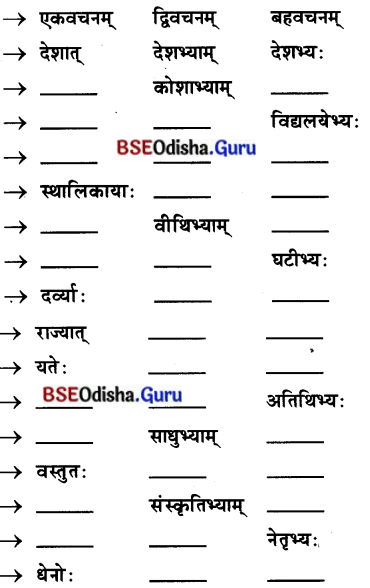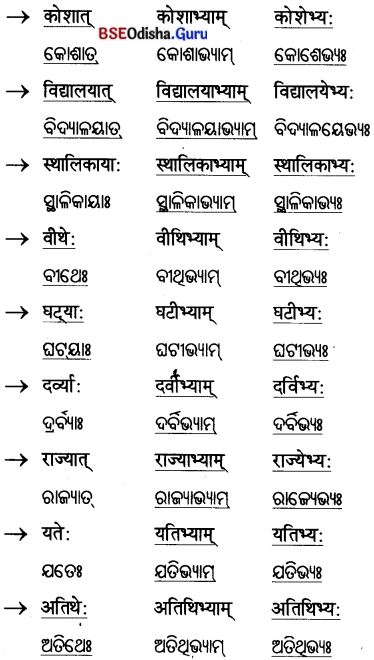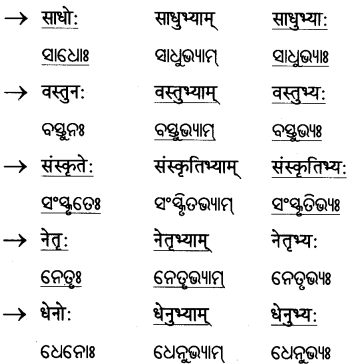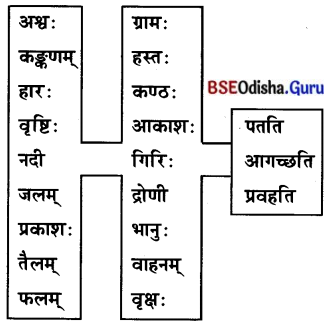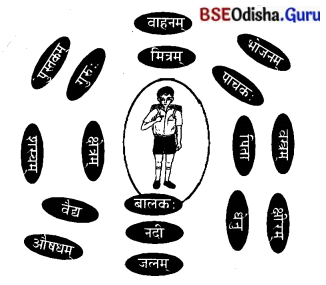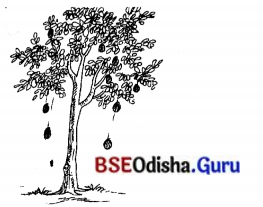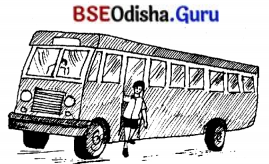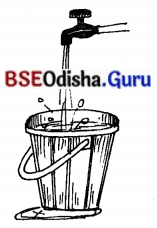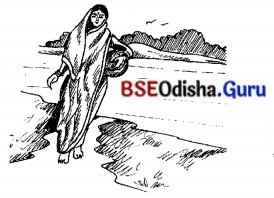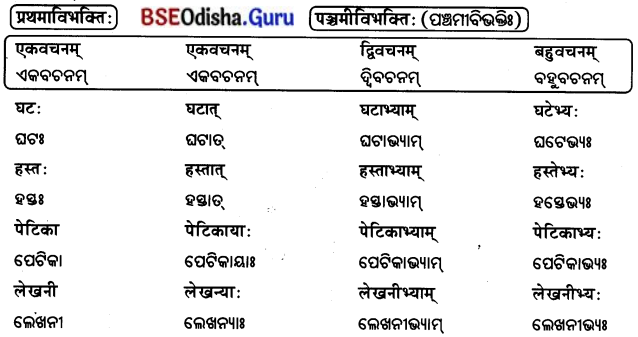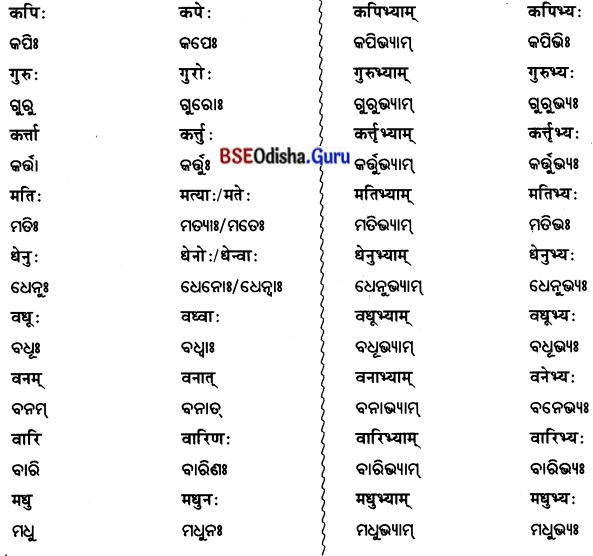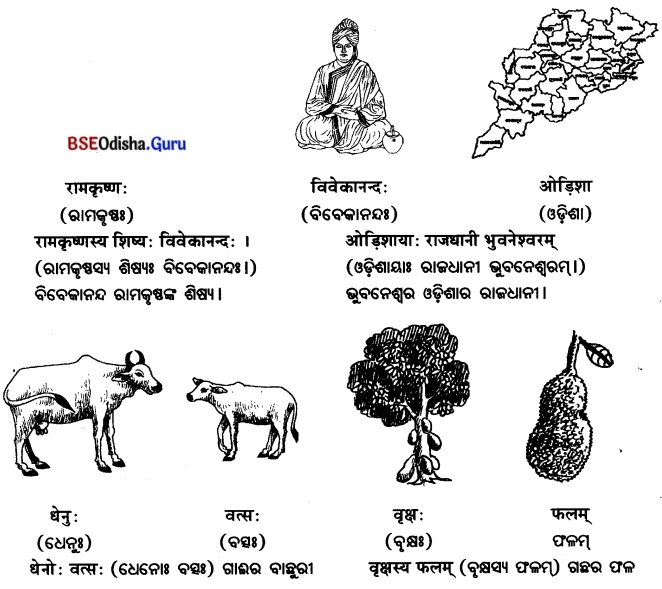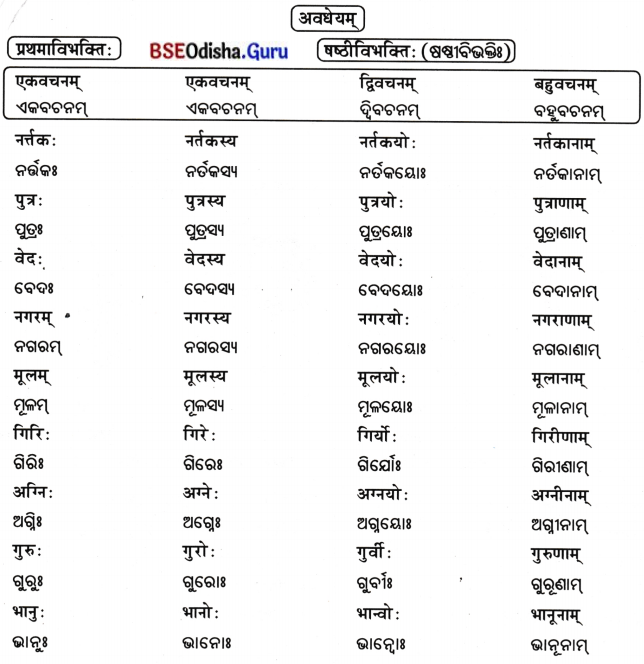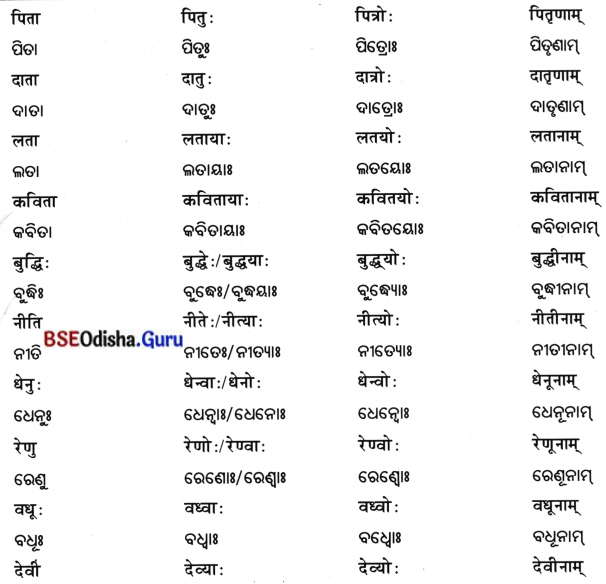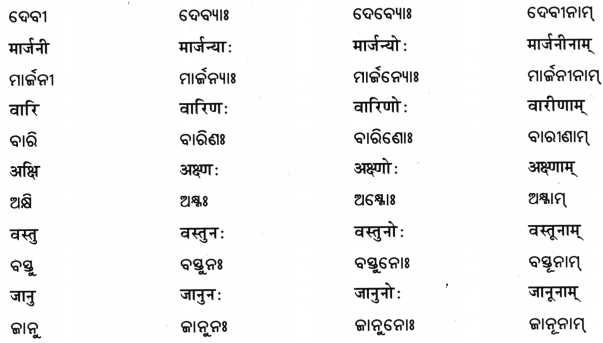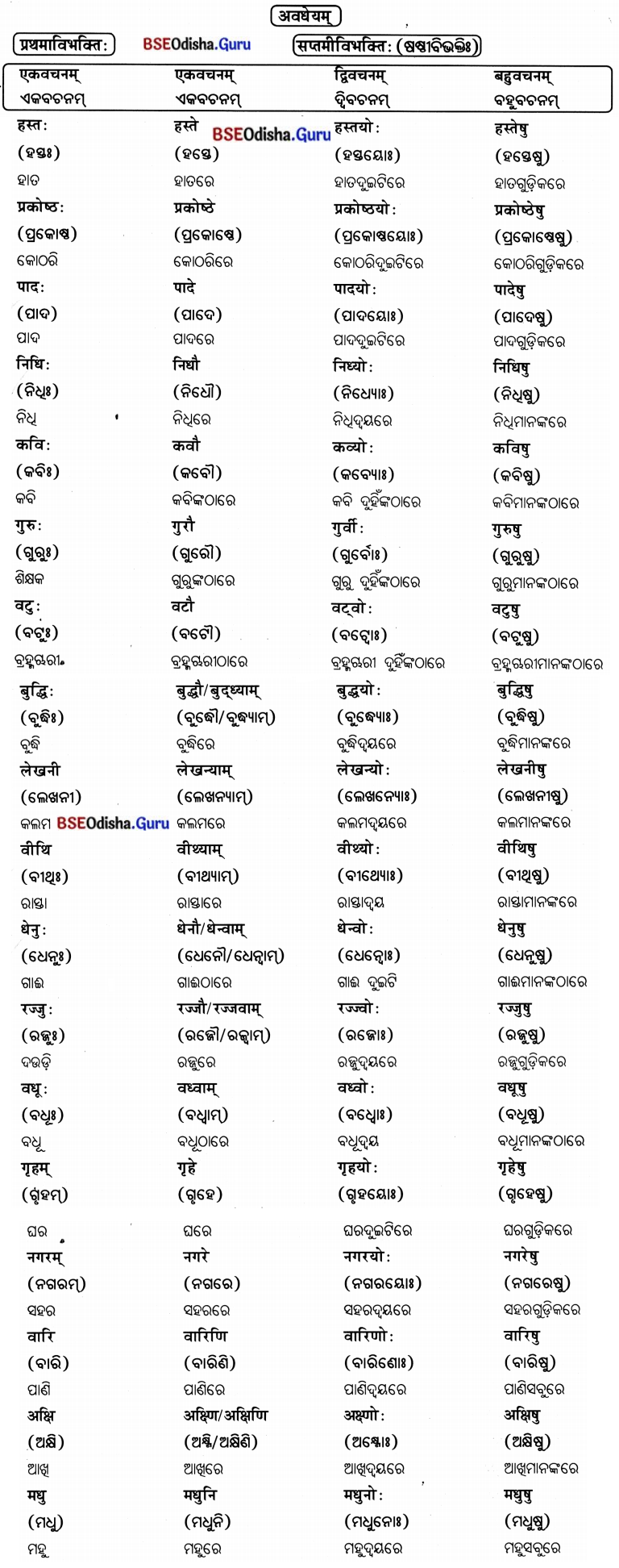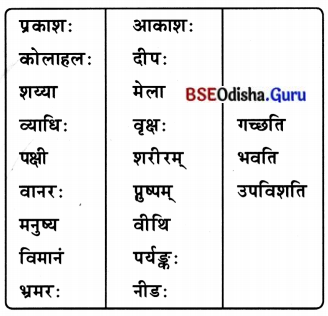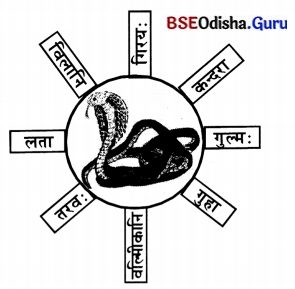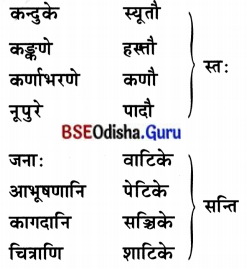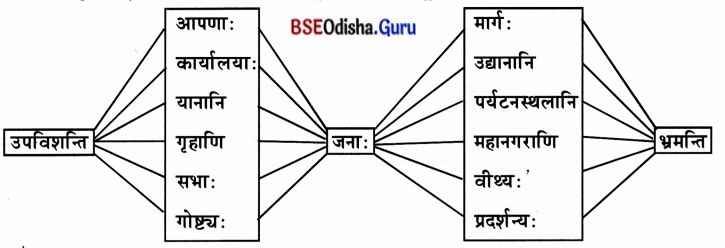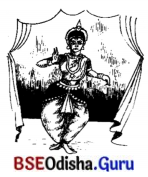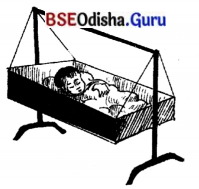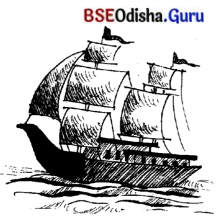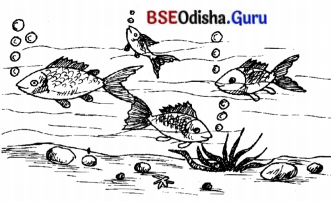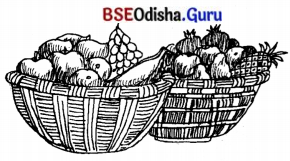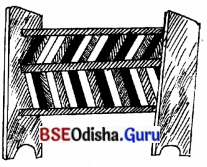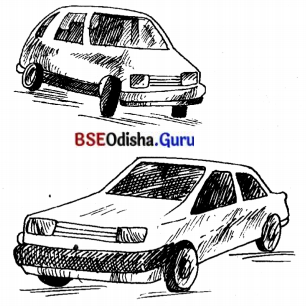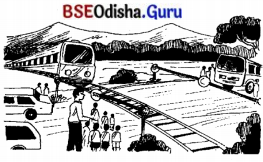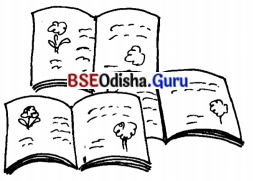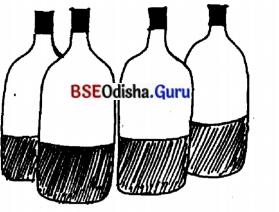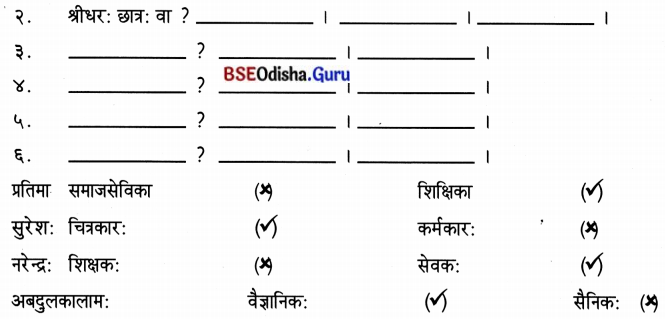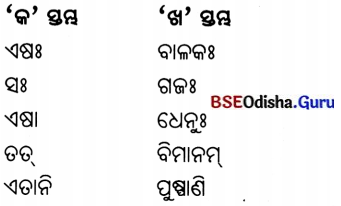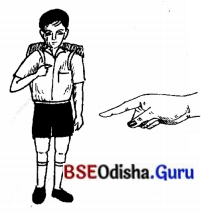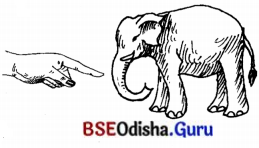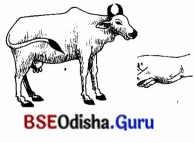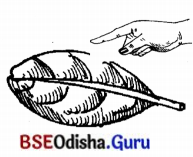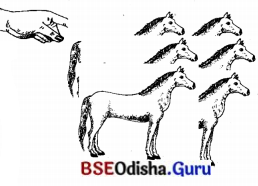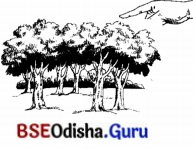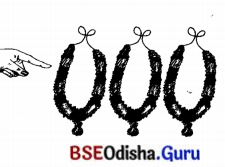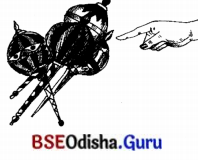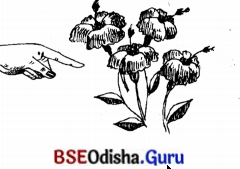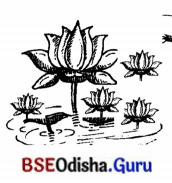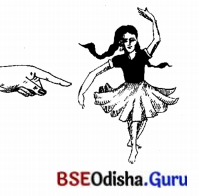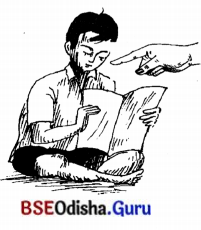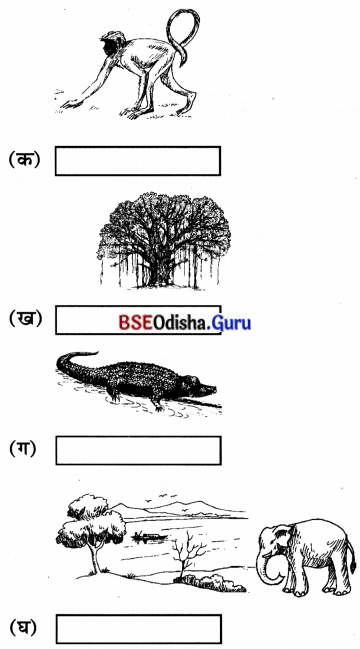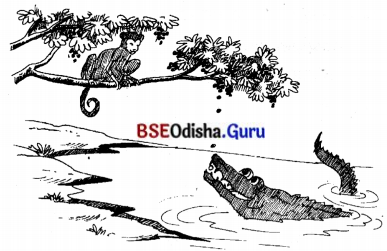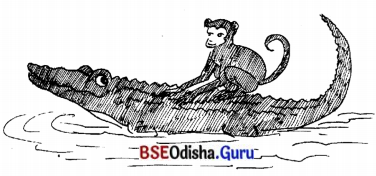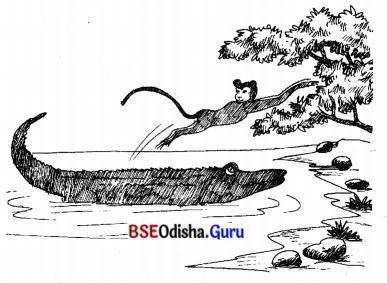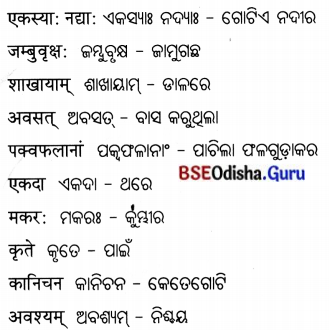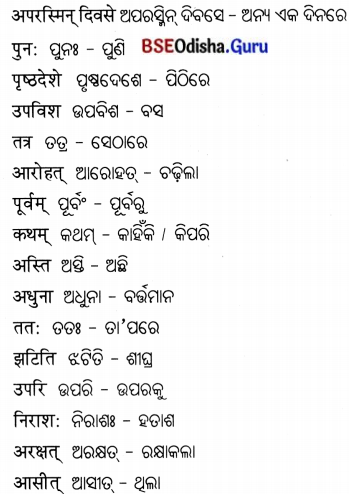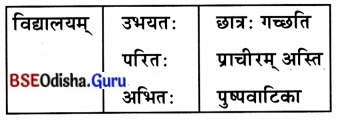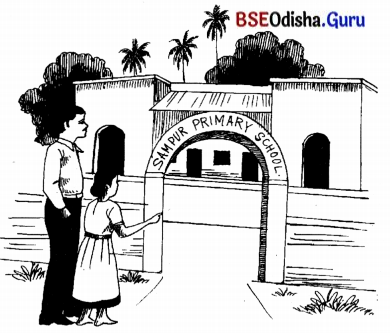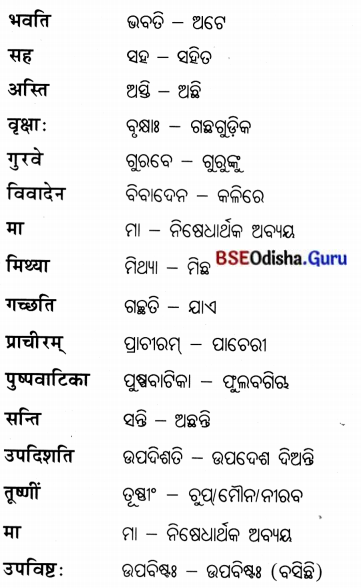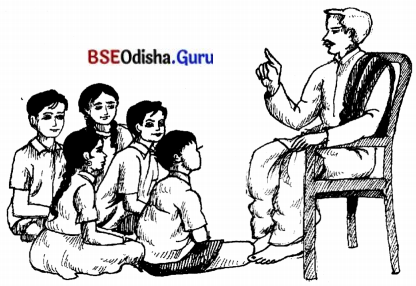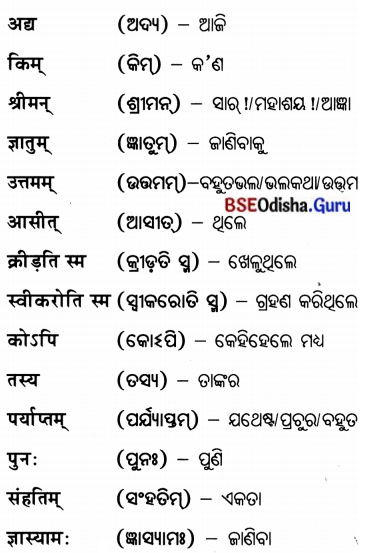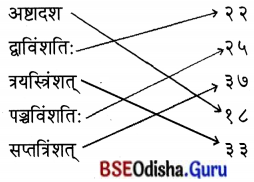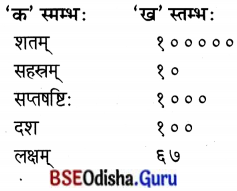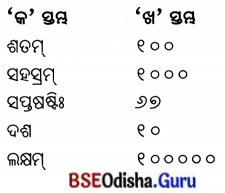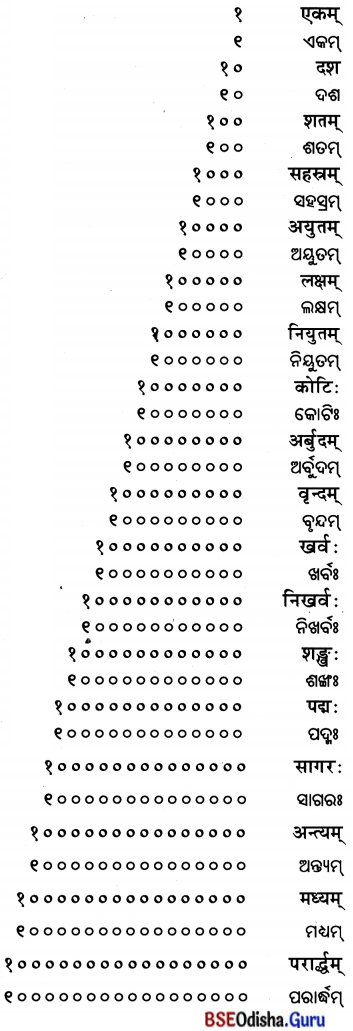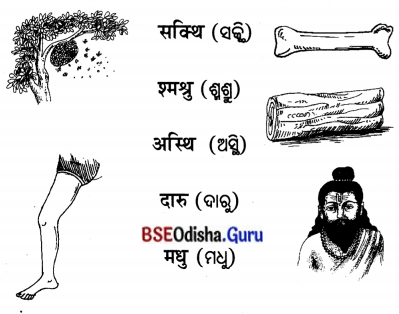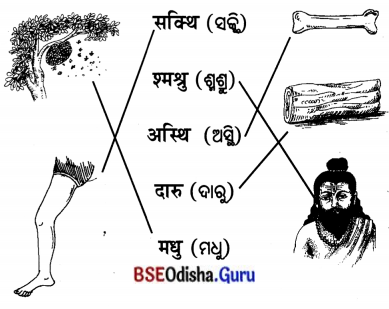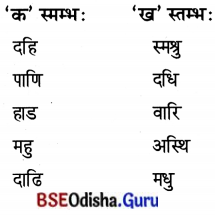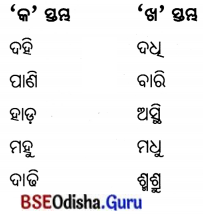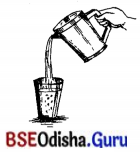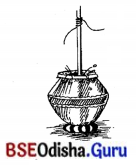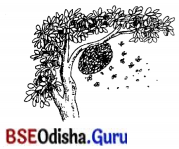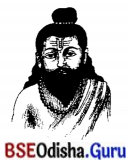Odisha State Board BSE Odisha 7th Class Sanskrit Solutions Chapter 21 ଶିଶୁଗୀତମ ଭାରତଭକ୍ତାଃ Textbook Exercise Questions and Answers.
BSE Odisha Class 7 Sanskrit Solutions Chapter 21 ଶିଶୁଗୀତମ ଭାରତଭକ୍ତାଃ
भारतभक्ता:
(ଭାରତଭକ୍ତା) ଭାରତ ଭକ୍ତମାନେ
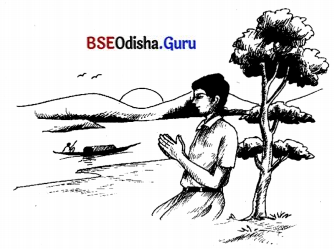
वयं बालका: भारतभक्ता:
ବୟଂ ବାଳକା ଭାରତଭକ୍ତା
वयं बालिका: भारतभक्ता:
ବୟଂ ବାଳିକା ଭାରତଭକ୍ତା
वयं हि सर्वे भारतभक्ता:
ବୟଂ ହି ସର୍ବେ ଭାରତଭକ୍ତା

भुवनत्रयं विजेतुं शक्ताः । वयम् …
ଭୁବନତ୍ରୟଂ ବିଜେପୁଂ ଶକ୍ତା । ବୟମ୍ …
वयं सुधीरा: वयं सुवीरा:
ବୟଂ ସୁଧୀରଃ ବୟଂ ସୁବୀରା
हृष्टमानसाः पुष्टशरीरा:
ହୃଷ୍ଟମାନସ ପୁଷ୍ଟଶରୀରା
सम्यक् पठाम: सम्यक् लिखाम:
ସମ୍ୟକ୍ ପଠାମଃ ସମ୍ୟକ୍ ଲିଖାମ
लोकसेवायां युक्ता: भवामः। वयम् …
ସମ୍ୟକ୍ ପଠାମଃ ସମ୍ୟକ୍ ଲିଖାମ
जातिधर्ममतभेदं त्यक्त्वा
ଜାତିଧର୍ମମତଭେଦଂ ତ୍ୟକ୍ସା
भारतवर्षं पूज्यं मत्वा
ଭାରତବର୍ଷ ପୂଜ୍ୟ ମତ୍ସ୍ୟ
ऐक्यभावं हृदये धृत्वा
ଐକ୍ୟଭାବଂ ହୃଦୟେ ଧୃତ୍ଵ
देशसेवायामनुरक्ता ….. । वयम् ।
ଦେଶସେବାଯାମନୁରକ୍ତା … । ବୟମ୍ ।

शब्दार्थ (ଶବ୍ଦାର୍ଥ) :
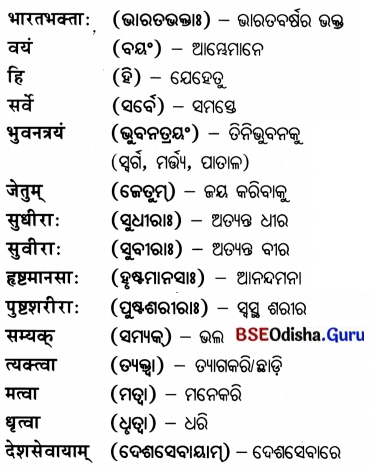
अतिरिक्त प्रश्नोत्तरम् (ଅତିରିକ୍ତ ପ୍ରଶ୍ନୋତ୍ତରମ୍)
१. मातृभाषया अर्थं प्रकाशयत।
(क) वयं
उत्तर : ଆମେମାନେ
(ख) जेतुम्
उत्तर : ଜୟ କରିବାକୁ
(ग) सम्यक्
उत्तर : ଭଲ

(घ) ऐक्यभावम्
उत्तर :ଏକତାଭାବ
(ङ) मत्वा
उत्तर : ମନେକରି
२. उत्तर चयनं कुरूत।
(क) के भारतभक्ता:?
(a) वालका:
(b) शालका:
(c) कृषकाः
(d) कारकाः
उत्तर :
(a) ବାଳକା
(ख) कस्यां युक्ता:भवामः ?
(a) सेवायां
(b) कार्ये
(c) लोकसेवाया
(d) पशुसेवायां
उत्तर :
(c) ଲୋକସେବାୟଂ
(ग) जातिधर्ममतभेदं किं कुर्मः ?
(a) जानीम:
(b) पश्याम:
(c) कुर्म:
(d) त्यजाम:
उत्तर :
(d) ତ୍ୟଜାମ
(ग) जातिधर्ममतभेदं किं कुर्मः ?
(a) जानीम:
(b) पश्याम:
(c) कुर्म:
(d) त्यजाम:
उत्तर :
(b) ଏକ୍ୟ

(ङ) वयं कस्याम् अनुरक्ता: भवाम: ?
(a) देशसेवाया
(b) वृक्षसेवाया
(c) पशुसेवायां
(d) मत्स्यसेवायां
उत्तर :
(b) ଏକ୍ୟ
प्रहेलिका (उत्तरं वदतु) ପ୍ରହେଳିକା (ଉତ୍ତର କୁହ)
कस्तुरी जायते कस्मात् ?
କସ୍ତୁରୀ ଜାୟତେ କସ୍ମାତ୍ ?
को हन्ति करिणां कुलम् ?
କୋ ହନ୍ତି କରିବାଂ କୁଳମ୍ ?
किं कुर्यात् कातरो युद्धे ?
କିଂ କୁର୍ଯ୍ୟାତ୍ କାତରୋ ଯୁଦ୍ଧେ ?
मृगात् सिंहः पलायते ।
ମୃଗାତ୍ ସିଂହଃ ପଳାୟତେ
वृक्षाग्रवासी न च पक्षिराज:
ବୃକ୍ଷାଗ୍ରବାସୀ ନ ଚ଼ ପକ୍ଷିରାଜଃ
त्रिनेत्रधारी न च शूलपाणिः।
ତ୍ରିନେତ୍ରଧାରୀ ନ ଚ଼ ଶୂଳପାଣି
त्वग्वस्त्रधारी न च सिद्धयोगी
ତ୍ବଗୁଧାରୀ ନ ବୃ ସିଦ୍ଧଯୋଗୀ ।
जलं च बिभ्रन्न घटो न मेघः।
ଜଳଂ ବୃ ବିଭ୍ରନ୍ନ ଘଟୋ ନ ମେଘ ।
कं संजधान कृष्णः
କଂ ସଂଜଧାନ କୃଷ୍ଣ
का शीतलवाहिनी गड्गा
କା ଶୀତଳବାହିନୀ ଗଙ୍ଗା
के दारपोषणरता:
କେ ଦାରପୋଷଣରତଃ
कं वलवन्तं न वाधते शीतम् ।
କଂ ବଳବନ୍ତ ନ ବାଧତେ ଶୀତମ୍ ।
अपदो दूरगामी च साक्षरो न च पणिडतः।
ଅପଦୋ ଦୂରଗାମୀ ଚ ସାକ୍ଷରେ ନ ଚ ପଣ୍ଡିତଃ ।
अमुखः स्कुटवक्ता च यो जानाति स पण्डितः ।।
ଅମୁଖ ସ୍କୁଟବକ୍ତା ଚ ୟୋ ଜାନାତି ସ ପଣ୍ଡିତଃ ||
न तस्यादिर्न तस्यान्तः मध्ये यस्तस्य तिष्ठति ।
ନ ତସ୍ୟାଦିର୍ନ ତସ୍ୟାନ୍ତଃ ମଧ୍ଯ ଯସ୍ତସ୍ୟ ତିଷ୍ଠତି ।

तवाप्यस्ति ममाप्यस्ति यदि जानासि तद् वद ।।
ତବାପ୍ୟସ୍ତି ମମାଧ୍ୟସ୍ଥି ଯଦି ଜାନାସି ତଦ୍ ବଦ ।।
कठिनशब्दार्थः (କଠିନଶବ୍ଦ) କଠିନ ଶବ୍ଦ :
- जायते (ଜାୟତେ) – ଜାତ ହୁଏ
- हन्ति (ହନ୍ତି) – ହତ୍ୟା କରେ
- करिणाम् (କରିଣାମ୍) – ହାତୀମାନଙ୍କର
- कातरः (କାତରଃ) – ଭୀରୁ
- शूलपाणि: (ଶୂନଃପାଣି) – ଶିବା ଶଙ୍କର
- विभ्रन् ଭଗବାନ (ବିଭ୍ରନ୍) – ଧାରଣ କରୁଥିବା
- जघान (ଜଘାନ) – ମାରିଥିଲେ
- पोषणरता: (ପୋଷଣରତାଃ) – ପୋଷଣକାରୀ
- स्कुटवक्ता (ସ୍ଫୁଟବକ୍ତା) – ଯଥାର୍ଥ ବକ୍ତା
- त्वग्वस्त्रधारी (ଦ୍ବିଗବସ୍ତ୍ରଧାରୀ) – ବକଳ ବସ୍ତ୍ରଧାରୀ
- वाधते (ବାଧତେ) – ବାଧାଦିଏ
- वृक्षाग्रवासी (ବୃକ୍ଷାଗ୍ରବାସୀ) – ବୃକ୍ଷ ଅଗ୍ରଭାଗରେ ଯିଏ ବାସକରେ।
- दूरगामी (ଦୂରଗାମୀ) – ଦୂରସ୍ଥାନକୁ ଯାତ୍ରାକରେ ଯେ
- पणिडत: (ପଣ୍ଡିତଃ) – ବିଦ୍ବାନ୍
- अमुख: (ଅମୁଖ) – ମୁଖ ନାହିଁ ଯାହାର
- तद् (ତଦ୍) – ତାହା
सन्धि (ସନ୍ଧି):
तस्य + आदि + न = तस्यादिर्न
ତଥ୍ୟ + ଆଦି + ନ = ତସ୍ୟାଦିର୍ନ
य: + तस्य = यतस्य
ଯଃ + ତଥ୍ୟ = ଯତସ୍ୟ
मम + अपि + अस्ति = ममाप्यस्ति
ମମ + ଅପି + ଅସ୍ଥି = ମମାପ୍ୟସ୍ତ
तस्य + अन्त: = तस्यान्त:
ତସ୍ୟ + ଅନ୍ତଃ = ତସ୍ୟାନ୍ତଃ
अतिरिक्त प्रश्नोत्तरम् (ଅତିରିକ୍ତ ପ୍ରଶ୍ନୋତ୍ତରମ୍)
१. मातृभाषया अर्थं प्रकाशयत।
(क) जायते
उत्तर : ଜାତହୁଏ
(ख) कातरः
उत्तर : ଭୀରୁ
(ग) वाधते
उत्तर : ବାଧାଦିଏ

(घ) विभ्रन्
उत्तर : ଧାରଣ କରୁଥିବା
(ङ) पण्डितः
उत्तर : ବିଦ୍ବାନ୍
२. उत्तर चयनं कुरूत।
(क) मृगात्क:पलायते ?
(a) सिंह:
(b) मार्जार:
(c) शृगाल:
(d) मृग:
उत्तर :
(a) ସିଂହ
(ख) वृक्षाग्रवासी न च …………
(a) राज:
(b) पक्षीराज:
(c) पशुराज:
(d) स्वराज:
उत्तर :
(b) ପକ୍ଷୀରାଜଃ
(ग) ……………. न च पण्डितः।
(a) अक्षरो
(b) प्रक्षरो
(c) साक्षरो
(d) चक्षरो
उत्तर :
(c) ସାକ୍ଷରୋ
(घ) य: जानाति स: ……………. |
(a) मूर्ख:
(b) वाचाल:
(c) गुणी
(d) पण्डित:
उत्तर :
(d) ପଣ୍ଡିତଃ

(ङ) त्रिनेत्रधारी न च ………. पाणि:।
(a) शूल
(b) तिल
(c) निल
(d) नील
उत्तर :
(a) ଶୂଳ
सुभाषितानि ସୁଭାଷିତାନି (ସୁଭାଷିତ)
माता शत्रु : पिता वैरी येन बालो न पाठितः ।
न शोभते सभामध्ये हंसमध्ये बको यथा ।।१।।
ମାତା ଶତ୍ରୁ ପିତା ବୈରୀ ଯେନ ବାଳୋ ନ ପାଠିତଃ
ନ ଶୋଭତେ ସଭାମଧେ ହଂସମସ୍ତେ ବକୋ ଯଥା ।।୧।।
अर्थः (ଅର୍ଥ)
या माता बालं न पाठयति सा माता शत्रु भवति।
यः पिता न पाठयति । सः पिता वैरी भवति ।
हंसमध्ये वक: यथा न शोभते तथा अयं
मूर्ख: बाल: सभामध्ये न शोभते ।
ଯା ମାତା ବାଳଂ ନ ପାଠୟତି ସା ମାତା ଶତଃ ଭବତି।
ଯଃ ପିତା ନ ପାଠୟତି। ଡଃ ପିତା ବୈରୀ ଭବତି।
ହଂସମସ୍ତେ ବୟଃ ଯଥା ନ ଶୋଭତେ ତଥା
ଅୟଂ ମୂର୍ଖ ବାନଃ ସଭାମଧେ ନ ଶୋଭିତେ।
शब्दार्थ (ଶବ୍ଦାର୍ଥ) :
- पाठयति (ପାଠୟତି) – ପଢ଼ାଏ
- स: (ନଃ) – ସେହି
- सा (ସା) – ସେହି
- वैरी (ବୈରୀ) – ଶତ୍ରୁ
- यथा (ଯଥା) – ଯେପରି
- तथा (ତଥା) – ଯେପରି
- शोभते (ଶୋଭତେ) – ଶୋଭାପାଏ
ଅର୍ଥ :
ଯେଉଁ ମାଆ ପିଲାକୁ ପଢ଼ାଏ ନାହିଁ । ସେ ମାଆ ଶତ୍ରୁ ଅଟେ । ଯେଉଁ ପିତା ପାଠ ପଢ଼ାଏ ନାହିଁ। ସେ ପିତା ଶତ୍ରୁ ଅଟେ । ହଂସ ମଧ୍ୟରେ ବଗ ଯେପରି ଶୋଭା ପାଏ ନାହିଁ । ସେହିପରି ଏହି ମୂର୍ଖ ବାଳକ ସଭା ମଧ୍ଯରେ ଶୋଭା ପାଏ ନାହିଁ।
पठतो नास्ति मूर्खत्वं जपतो नास्ति पातकम् ।
मौनिनः कलहः नास्ति न भयं चास्ति जाग्रतः।।२।।
ପଠତୋ ନାସ୍ତି ମୂର୍ଖତଂ ଜପତୋ ନାସ୍ତି ପାତକମ୍ ।
ମୌନିନଃ କଳହୋ ନାସ୍ତି ନ ଭୟଂ ଚାସ୍ତି ଜାଗ୍ରତଃ
अर्थः (ଅର୍ଥ)
पठत: जनस्य मूर्खत्वं नास्ति ।
जपत: लोकस्य पातकं नास्ति ।
मौनिजनस्य कलह: नास्ति ।
जाग्रत: जनस्य भय: नास्ति ।
ପଠତଃ ଜନସ୍ୟ ମୂର୍ଖତଂ ନାସ୍ତି ।
ଜପତଃ ଲୋକସ୍ୟ ପାତକଂ ନାସ୍ତି।
ମୌନିଜନସ୍ୟ କଳହ ନାସ୍ତି।
ଜାଗ୍ରତଃ ଜନସ୍ୟ ଭୟ ନାସ୍ତି।

शब्दार्थ (ଶବ୍ଦାର୍ଥ) :
- पठतः (ପଠତଃ) – ପଢୁଥିବା
- नास्ति (ନାସ୍ତି) – ନାହିଁ
- जपतः (ଜପତଃ) – ଜପ କରୁଥିବା
- पातकं (ପାତକଂ) – ପାପ
- मौनिजनस्य (ମୌନିଜନସ୍ୟ )–ନୀରବ ଥିବା ଲୋକର
- कलहः(କଳହଃ) – ବିବାଦ
- जाग्रतः (ଜାଗ୍ରତଃ) – ଜାଗ୍ରତ ଥିବା
ଅର୍ଥ :
ପାଠ ପଢ଼ୁଥିବା ଲୋକର ମୂର୍ଖତ୍ଵ ରହେ ନାହିଁ । ଜପ କରୁଥିବା ଲୋକର ପାପ ରହେ ନାହିଁ । ନୀରବ ରହୁଥିବା ଲୋକର ବିବାଦ ଉପୁଜେ ନାହିଁ । ଜାଗ୍ରତ ଥିବା ଲୋକର ଭୟ ରହେ ନାହିଁ ।
विद्या ददाति विनयं विनयाद् याति पात्रताम् ।
पात्रत्वाद् धनम् आप्नोति धनाद्वर्मं ततः सुखम् ।।३ ।।
ବିଦ୍ୟା ଦଦାତି ବିନୟଂ ବିନୟାଦ୍ ଯାତି ପାତ୍ରତାମ୍
ପାତ୍ରତ୍ବାଦ୍ ଧନମ୍ ଆପ୍ଳୁତି ଧନାଦ୍ ଧର୍ମ ତତଃ ସୁଖମ୍ ।।୩ । ।
अर्थः (ଅର୍ଥ)
विद्या विनयं ददाति । विनयात् पात्रतां याति ।
पात्रत्वात् धनम् आप्नोति । धनात् धर्मं ततः सुखम् आप्नोति।
ବିଦ୍ୟା ବିନୟଂ ଦଦାତି । ବିନୟାଦ୍ ପାତ୍ରତାଂ ଯାତି।
ପାତ୍ରତ୍ୱାତ୍ ଧନମ୍ ଆପ୍ଳୁତି।
ଧନାତ୍ ଧର୍ମ ତତଃ ସୁଖମ୍ ଆଷ୍ଟୋତି।
शब्दार्थ (ଶବ୍ଦାର୍ଥ) :
- ददाति (ଦଦାତି) – ଦାନକରେ
- विनयं (ବିନୟଂ) – ନମ୍ରତା
- विनयात् (ବିନୟାତ୍) – ନମ୍ରତାରୁ
- पात्रताम् (ପାତ୍ରତାମ୍) – ଯୋଗ୍ୟତାକୁ
- आप्नोति (ଆପ୍ଳୁତି) – ଲାଭ କରେ
- ततः (ତତଃ ) – ସେଥୁରୁ
- सुखम् (ସୁଖମ୍ ) – ସୁଖ
ଅର୍ଥ :
ବିଦ୍ୟା ନମ୍ରତା ଦାନ କରେ। ନମ୍ରତାରୁ ଯୋଗ୍ୟତା ଜାତ ହୁଏ। ଯୋଗ୍ୟତାରୁ ଧନ ପ୍ରାପ୍ତି ହୁଏ। ଧନରୁ ଧର୍ମ ଏବଂ ସେଥୁରୁ ସୁଖ ମିଳେ।
वृक्षः पुष्पाणि शाकं सस्यं फलानि प्राणवायुं
(अम्लजानं) छायां च ददाति। अतः वृक्षस्य रोपणं कुरु ।
ବୃକ୍ଷେ ଦଦାତି ପୁଷ୍ପାଣି ଶାକଂ ସସ୍ୟ ଫଳାନି ତୁ ।
ପ୍ରାଣବାୟୁ ଚ ଛାୟାଂ ବୈ କୁରୁ ବୃକ୍ଷସ୍ୟ ରୋପଣମ୍ ।।୪।।
अर्थः (ଅର୍ଥ )
वृक्षः पुष्पाणि शाकं सस्यं फलानि प्राणवायुं (अम्लजानं)
छायां च ददाति। अतः वृक्षस्य रोपणं कुरु ।
ବୃକ୍ଷ ପୁଷ୍ପାଣି ଶାକଂ ସସ୍ୟ ଫଳାନି
ପ୍ରାଣବାୟୁ ଚ ଦଦାତି । ଅତଃ ବୃକ୍ଷସ୍ୟ ରୋପଣଂ କୁରୁ।
शब्दार्थ (ଶବ୍ଦାର୍ଥ) :
- पुष्पाणि (ପୁଷ୍ପାଣି) – ଫୁଲଗୁଡ଼ିକ
- शाकं (ଶାକଂ) – ଶାଗ
- सस्यं (ସସ୍ଯ) – ଶସ୍ୟ
- प्राणवायुं (ପ୍ରାଣବାୟୁ) – ଅମ୍ଳଜାନ
- छायां (ଛାୟା) – ଛାଇ
- अतः (ଅତଃ) – ଏଣୁ
- रोपणं कुरु (ରୋପଣଂ କୁରୁ) – ରୋପଣ କରା ଲଗାଅ
ଅର୍ଥ :
ଗଛ, ଫୁଲ, ଶାଗ, ଶସ୍ୟ, ଫଳ ଓ ପ୍ରାଣବାୟୁ ପ୍ରଦାନ କରେ। ଏଣୁ ବୃକ୍ଷ ରୋପଣ କର।
अर्थः (ଅର୍ଥ)
अयं निजः परो वेति गणना लघुचेतसाम् ।
उदारचरितानां तु वसुधैव कुटुम्बकम् ।।५।।
ଅୟଂ ନିଜଃ ପରେ ବେତି ଗଣନା ଲଘୁଚେତସାମ୍ ।
ଉଦାରଚରିତାନାଂ ତୁ ବସୁଧୈବ କୁଟୁମ୍ବକମ୍ ।।୫।।

शब्दार्थ (ଶବ୍ଦାର୍ଥ) :
- निज: (ନିଜଃ) – ନିଜର ଆପଣାର
- परः (ପରଃ) – ଶତ୍ରୁ
- इति (ଇତି) – ବୋଲି ବି କିମ୍ବା
- गणना (ଗଣନା) – ବିଚାର
- लघुचेतसाम् (ଲଘୁଚେତସାମ) – ନୀଜମନା ଲୋକଙ୍କର
- उदारचरितानां (ଉଦାରଚରିତାନାଂ) – ଉଦାରମନା ଲୋକଙ୍କର
- तु (ତୁ) – କିନ୍ତୁ
- वसुधा (ବସୁଧା) – ପୃଥିବୀ
- कुटुम्बकम् (କୁଟୁମ୍ବକମ୍) – ପରିବାର/ କୁଟୁମ୍ବ
ଅର୍ଥୀ :
ଏହା ନିଜର କିମ୍ବା ଶତ୍ରୁର ଏହିପରି ବିଚାର ନୀଚ୍ଚମନା ଲୋକଙ୍କର ଥାଏ। ମାତ୍ର ଉଦାରହୃଦୟ ଲୋକଙ୍କ ବିଚାର ସାରା ସଂସାର ହିଁ ଏକ ପରିବାର।
पृथिव्यां त्रीणि रत्नानि जलम अन्त्रं सुभाषितम् ।
मूढै: पाषाणखण्डेषु रत्नसंज्ञा विधीयते ।।६।।
ପୃଥବ୍ୟା ତ୍ରୀଣି ରତ୍ନାନି ଜଳମ୍ ଅନଂ ସୁଭାଷିତମ୍ ।
ମୂଜଃ ପାଷାଣଖଣ୍ଡେଷୁ ରତ୍ନସଂଜ୍ଞା ବିଧୀୟତେ ।।୬।।
अर्थः (ଅର୍ଥ)
जलम् अन्नं सुभाषितम् इति त्रीणि रत्नानि पृथिव्यां सन्ति।
मूढा: जना: पाषाणखण्डेषु रत्नम् इति विचारयन्ति ।
ଜଳମ୍ ଅନଂ ସୁଭାଷିତମ୍ ଇତି ତ୍ରୀଣି ରତ୍ନାନି ପୃଥବ୍ୟା ସନ୍ତି ।
ମୂଢା ଜନଃ ପାଷାଣଖଣ୍ଡେଷୁ ରତ୍ନମ୍ ଇତି ବିଚାରୟନ୍ତି।
शब्दार्थ (ଶବ୍ଦାର୍ଥ) :
- जलम् (ଜଳମୂ) – ପାଣି
- अन्नं (ଅନଂ) – ଖାଦ୍ୟ
- पृथिव्यां (ପୃଥୁବ୍ୟା) – ପୃଥିବୀରେ
- मूढा: (ମୂଢା) – ମୂର୍ଖମାନେ
- पाषाणखण्डेषु (ପାଷାଣଖଣ୍ଡେଷୁ)—ପଥରଖଣ୍ଡମାନଙ୍କରେ
- संज्ञा (ସଂଜ୍ଞା) – ନାମ
- विधीयते (ବିଧୀୟତେ) – ବିଧାନ କରନ୍ତି

ଅର୍ଥୀ :
ଜଳ ଅନ୍ନ ଏବଂ ସୁଭାଷିତ ତିନିଗୋଟି ରତ୍ନ ପୃଥିବୀରେ ରହିଛି । ମୂର୍ଖମାନେ ପାଷାଣଖଣ୍ଡମାନଙ୍କରେ ରତ୍ନ ବୋଲି ନାମକରଣ କରନ୍ତି ।
हस्तस्य भूषणं दानं सत्यं कण्ठस्य भूषणम् ।
श्रोत्रस्य भूषणं शास्त्रं भूषणै : किं प्रयोजनम् ।।७।।
ହସ୍ତସ୍ୟ ଭୂଷଣଂ ଦାନଂ ସତ୍ୟ କଣ୍ଠସ୍ୟ ଭୂଷଣମ୍
ଶ୍ରୋତ୍ରସ୍ୟ ଭୂଷଣଂ ଶାସ୍ତ୍ର ଭୂଷଣି କିଂ ପ୍ରୟୋଜନମ୍ ||୭||
अर्थः (ଅର୍ଥ)
ଦାନଂ ହସ୍ତସ୍ୟ ଭୂଷଣମ୍। ସତ୍ୟ କଣ୍ଠସ୍ୟ ଭୂଷଣମ୍ । ଶାସ୍ତ୍ର ଶ୍ରୋତ୍ରସ୍ୟ ଭୂଷଣମ୍। ଅତଃ ଭୂଷଣି କିଂ ବା
ପ୍ରୟୋଜନମ୍ ।
शब्दार्थ (ଶବ୍ଦାର୍ଥ) :
- भूषणम् (ଭୂଷଣମ୍) – ଅଳଙ୍କାର
- कण्ठस्य (କଣ୍ଠସ୍ୟ) – କଣ୍ଠର
- श्रोत्रस्य (ଶ୍ରୋତ୍ରସ୍ୟ) – କାନର
- अतः (ଅତଃ) – ଏଣୁ
- किं (କିଂ) – କ’ଣ
- प्रयोजनं (ପ୍ରୟୋଜନଂ) ଆବଶ୍ୟକ
ଅର୍ଥ :
ଦାନ ହାତର ଅଳଙ୍କାର । ସତ୍ୟ କଣ୍ଠର ଭୂଷଣ। ଶାସ୍ତ୍ର କଣ୍ଠିର ଭୂଷଣ। ଏଣୁ ଅନ୍ୟ ଭୂଷଣରେ କ’ଣ ବା ପ୍ରୟୋଜନ।
अतिरिक्त प्रश्नोत्तरम्
(ଅତିରିକ୍ତ ପ୍ରଶ୍ନୋତ୍ତରମ୍)
१. मातृभाषया अर्थं प्रकाशयत।
(क) शोभते
उत्तर :
ଶୋଭାପାଏ
(ख) कलहः
उत्तर :
ବିବାଦ
(ग) भूषणम्
उत्तर :
ଅଳଙ୍କାର
(घ) वर्तुधा
उत्तर :
ପୃଥ୍ବୀ
(ङ) ददाति
उत्तर :
ଦାନ କରେ
२. उत्तर चयनं कुरूत।
(क) जपतः किं नास्ति ?
(a) पातकं
(b) जातकं
(c) शतकं
(d) नतकं
उत्तर :
(a) ପାତଙ୍କ
(ख) पात्रत्वात् किम् आप्नोति ?
(a) जनम्
(b) धनम्
(c) मानम्
(d) ध्यानम्
उत्तर :
(b) ଧନମ୍
(ग) हस्तस्य भूषणं किम् ?
(a) कङ्कणम्
(b) सुवर्णम्
(c) दानम्
(d) चन्दनम्
उत्तर :
(c) ଦାନମ୍
(घ) अयं निजः परो वेति केषा गणना ?
(a) मानवाना
(b) जनाना
(c) मूर्खाणां
(d) लघुचेतसा
उत्तर :
(d) ଲଘୁଚେତସାଂ

(ङ) वृक्षः कानि ददाति ?
(a) पुष्पाणि
(b) जलानि
(c) मलानि
(d) क्रीडनकानि
उत्तर :
(a) ପୁଷ୍ପାଣି
के च ते (କେ ବୃ ତେ) ସେମାନେ କିଏ ?
बानुरः
पश्यत वानरराजं दक्षम्
कूर्दति वृक्षादन्यं वृक्षम् ।
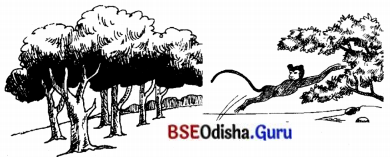
ବାନରଃ
ପଶ୍ୟତ ବାନରାଜଂ ଦକ୍ଷମ୍
କୃର୍ଦତି ବୃକ୍ଷାଦନ୍ୟ ବୃକ୍ଷମ୍ ।
कुक्कुरः
दृष्ट्वा रात्रौ एकं चौरम्
भषति कुक्कुरो वारं वारम् ।
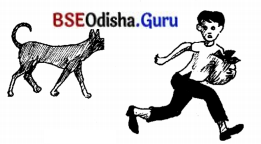
କୁକ୍କୁର
ଦୃଷ୍ଟା ରାତ୍ରି ଏକଂ ଚୌରମ୍
ଭଷତି କୁକୁରେ ବାରଂ ବାରମ୍ ।
मार्जारी
माजारीयं खादति मीनम्
पिबति च दुग्धं तिष्ठति म़ौनम् ।

ମାର୍ଜାରୀ
ମାକାରୀୟଂ ଖାଦିତ ମୀନମ୍
ପିବତି ବୃ ଦୁଗ୍ଧ ତିଷ୍ଠତି ମୌନମ୍ ।
मधुपः
मधुपोऽयं विहरति सानन्दम्
पायं पायं मधुमकरन्दम्
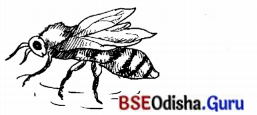
ମଧୁପଃ
ମଧୁପୋଽୟଂ ବିହରତି ସାନନ୍ଦମ୍
ପାୟଂ ପାରଂ ମଧୁମକନ୍ଦମ୍ ।
हस्ती
हस्ती गच्छति मन्दं सुमन्दम्
जनयति चासौ नयनानन्दम् ।

ହସ୍ତୀ
ହସ୍ତୀ ଗଳ୍ପତି ମୟଂ ସୁମନ୍ଦମ୍
ଜନୟତି ଚାସୌ ନୟନାନନ୍ଦମ୍ ।

शशक:
शशकः सततं कुरुते क्रीडाम्
ततः परमनुभवति पीडाम् ।
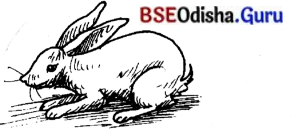
ଶଶକଃ
ଶଶକଃ ସତତଂ କୁରୁତେ କ୍ରୀଡ଼ାମ୍
ତତଃ ପରମନୁଭବତି ପୀଡ଼ାମ୍ ।
सन्धिविच्छदः (ସନ୍ଧିବିଚ୍ଛେଦଃ )
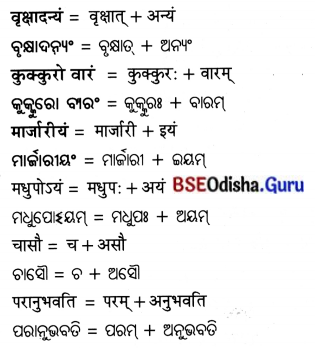
शब्दार्थ (ଶବ୍ଦାର୍ଥ) :
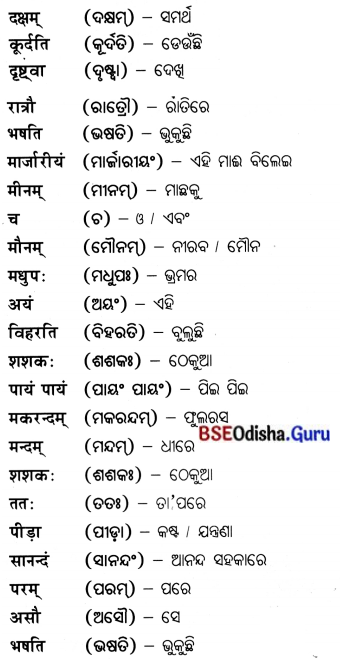
श्लोकार्था :
१. यूयं दक्षं वानरराजं पश्यत ।
असौ वृक्षात् अन्यं वृक्षं कूर्दति ।
ଯୂୟଂ ଦକ୍ଷୀ ବାନରରାଜ୍ୟ ପଶ୍ୟତ।
ଅସୌ ବୃକ୍ଷାତ୍ ଅନ୍ୟ ବକ୍ଷ କତି ।
२. रात्रौ एकं चौरं दृष्ट्ववा कुक्कुरः वारं वारं भषति।
ରାତ୍ରି ଏବଂ ଚୌରଂ ଦୃଷ୍ଟା କୁକୁରଃ ବାରଂ ବାରଂ ଭଷତି।
३. इयं मार्जारी मीनं खादति ।
दुग्धं पिबति । मौनं च तिष्ठति ।
ଇୟଂ ମାର୍ଜାରୀ ମୀନଂ ଖାଦତି।
ଦୁଗ୍ଧ ପିବତି । ମୌନଂ ଚ ତିଷ୍ଠତି।

४. अयं मधुप: मधुमकरन्दं पायं पायं सानन्दं विहरति।
ଅୟଂ ମଧୁରଃ ମଧୁମକରଣଂ ପାୟଂ ପାୟଂ ସାନନ୍ଦ ବିହରତି ।
५. हस्ती मन्दं सुमन्दं गच्छति ।
नयनानन्दं च असौ जनयति ।
ହସ୍ତୀ ମନଂ ସୁମନଂ ଗଚ୍ଛତି ।
ନୟନାନନ୍ଦ ଚ ଅସୌ ଜନୟତି ।
६. शशक: सततं क्रीड़ां कुरुते ।
ततः परं पीडाम् अनुभवति ।
ଶଶକଃ ସତତଂ କ୍ରୀଡ଼ା କୁରୁତେ ।
ତତଃ ପରଂ ପୀଡ଼ାମ୍ ଅନୁଭବତି ।
अतिरिक्त प्रश्नोत्तरम्
(ଅତିରିକ୍ତ ପ୍ରଶ୍ନୋତ୍ତରମ୍)
१. मातूभाषया अर्थं प्रकाशयत।
(क) कूर्दति
उत्तर : ଡେଉଛି
(ख) रात्रौ
उत्तर :
ରାତିରେ
(ग) मीनम्
उत्तर :
ମାଛକୁ
(घ) मधुपः
उत्तर :
ଭ୍ରମର
(ङ) शशक:
उत्तर :
ଠେକୁଆ
२. उत्तर चयनं कुरूत।
(क) क:वृक्षादन्यं वृक्षं कूर्दति ?
(a) वानरराज:
(b) मकरः
(c) शशक:
(d) मानव:
उत्तर :
(a) ବାନରରାଜଃ
(ख) रात्रौ कं दृष्ट्वा कुक्कुरः भषति ?
(a) जनं
(b) चौरं
(c) सर्पं
(d) कीटं
उत्तर :
(b) ଚୌରଂ
(ग) मधुपः किं पिबति ?
(a) रसं
(b) मधुं
(c) मधुमकरन्दं
(d) पुष्परसं
उत्तर :
(c) ମଧୁମକରଫ

(घ) का मीनं खादति ?
(a) कच्छप:
(b) बक:
(c) कुलीरक:
(d) मार्जारी
उत्तर :
(d) ମାର୍କାରୀ
(ङ) हस्ती कथं गच्छति ?
(a) सुमन्दं
(b) द्रुतं
(c) क्षिप्रं
(d) सत्वरं
उत्तर :
(a) ସୁମଙ୍ଘ
सुप्रभातम् (ସୁପ୍ରଭାତମ୍) ସୁପ୍ରଭାତ
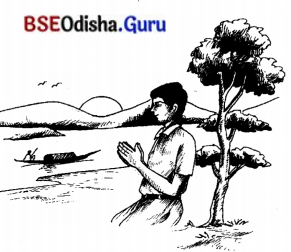
उदिते सूर्ये धरणी विहसति ।
ଉଦିତେ ସୂର୍ଯ୍ୟ ଧରଣୀ ବିହସତି ।
पक्षी कूजति कमलं विकसति ॥ १ ॥
ପକ୍ଷୀ କୂଜତି କମଳଂ ବିକସତି ।। ୧ ।।
नदति मन्दिरे उच्चै : ढक्का ।
ନଦତି ମନ୍ଦିରେ ଉଚ୍ଚି ଢକ୍କା ।
सरितः सलिले चलति नौका ।। २ ।।
ସରିତଃ ସଲିଳେ ଚଳତି ନୌକା ।। ୨||
पुष्पे पुष्पे नानारङ्गः ।
ପୁଷ୍ପ ପୁଷ୍ପ ନାନାରଙ୍ଗା ।
तेषु डयते चित्रविहझुगः।। ३ ।।
ତେଷୁ ଜୟତେ ଚିତ୍ରବିହଙ୍ଗା ।। ୩ ।।

वृक्षे वृक्षे नूतनपत्रम् ।
ବୃକ୍ଷେ ବୃକ୍ଷେ ନୂତନପତ୍ରମ୍ ।
विविधै : वर्णं: विभाति चित्रम् ॥
ବିବିଧଃ ବହିଃ ବିଭାତି ଚିତ୍ରମ୍ ।। ୪ ।।
गहने विपिने व्याघ्रो गर्जति ।
ଗହନେ ବିପିନେ ବ୍ୟାଘ୍ର ଗର୍ଜତି ।
उच्चै : तत्र सिंहः क्रोशति ।। ५ ।।
ଉଚ୍ଚୈଃ ତତ୍ର ସିଂହଃ କ୍ରୋଶତି ।। ୫ ।।
हरिणोऽयं खादति नवघासम् ।
ହରିଣୋଽୟଂ ଖାଦତି ନବଘାସମ୍ ।
सर्वत्र च पश्यति सविलासम् ।। ६ ।।
ସର୍ବତ୍ର ବୃ ପଶ୍ୟତି ସବିଳାସମ୍ || ୬ ||
घोटकराज : क्षिप्रं धावति ।
ଘୋଟକରାଜଃ କ୍ଷିପୁଂ ଧାବତି ।
धावनकाले किमपि न खादति ।। ७ ।।
ଧାବନକାଳେ କିମପି ନ ଖାଦତି || ୭ ||
पश्यत भल्लुकमिमं करालम्
ପଶ୍ୟତ ଭଲୁକମଂ କରାଲମ୍
नृत्यति थर्थधै कुरु करातालम् ।। ८।।
ନୃତ୍ୟତି ଥଥଥୈ କୁରୁ କରାତାଳମ୍ ।। ୮ ।।
सन्धिविच्छदः (ସନ୍ଧିବିଚ୍ଛେଦ) :
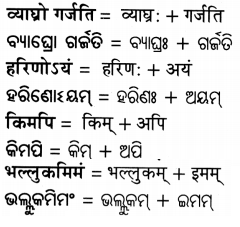
शब्दार्थ (ଶବ୍ଦାର୍ଥ) :
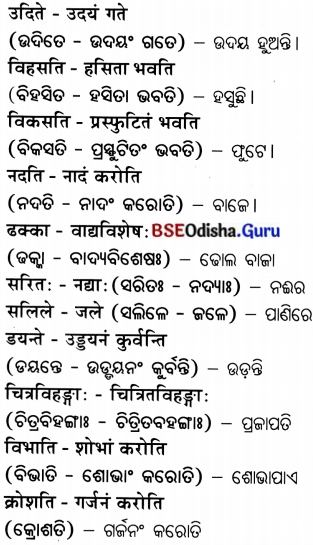
अतिरिक्त प्रश्नोत्तरम्
(ଅତିରିକ୍ତ ପ୍ରଶ୍ନୋତ୍ତରମ୍)
१. मातृभाषया अर्थं प्रकाशयत।
(क) कूजति
उत्तर :
ଭାବୁଛି
(ख) नूतनपत्रम्
उत्तर :
ନୂଆପତ୍ର
(ग) विपिने
उत्तर :
ବଣରେ
(घ) खादति
उत्तर :
ଖାଉଛି

(ङ) भल्लुक:
उत्तर :
ଭାଲୁ
२. उत्तर चयनं कुरूत।
(क) सूर्ये उदिते का विहसति ?
(a) लता
(b) माला
(c) धरणी
(d) जननी
उत्तर :
(c) ଧରଣୀ
(ख) ढक्का कुत्र उच्चै: नदति ?
(a) मन्दिरे
(b) गृहे
(c) प्रान्तरे
(d) मार्गे
उत्तर :
(a) ମନ୍ଦିରେ
(ग) कः क्षिप्रं धावति ?
(a) पशुराज:
(b) घोटकराज:
(c) शशक:
(d) व्याघ्र:
उत्तर :
(b) ଘୋଟକରାଜଃ
(घ) व्याघ्र: कुत्र गर्जति ?
(a) गुहाया
(b) वने
(c) विपिने
(d) गृहे
उत्तर :
(c) ବିପିନେ

(ङ) सिंहः किं करोति ?
(a) चलति
(b) निद्राति
(c) पश्यति
(d) क्रोशति
उत्तर :
(d) କ୍ରୋଶତି
रक्ष रक्ष काननम्
(ରକ୍ଷ ରକ୍ଷ କାନନମ୍) ଅରଣ୍ୟ ରକ୍ଷା କର
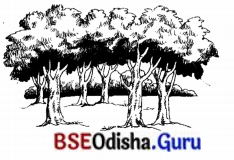
रक्ष रक्ष काननम्
ରକ୍ଷ ରକ୍ଷ କାନନମ୍
वृक्षराशिशोभनम् ।
ବୃକ୍ଷରାଶିଶୋଭନମ୍ ।
काले वृष्टिकारकम्
କାଳେ ବୃଷ୍ଟିକାରକମ୍
शुद्धवायुदायकम् ।। १ ।।
ଶୁଦ୍ଧବାୟୁଦାୟକମ୍ || ୧ ||
रोगवारणोचिता
ରୋଗବାରଣୋଚିତା
मूलिका वने स्थिता ।
ମୂଳିକା ବନେ ସ୍ଥିତା ।
सम्पदां हि सम्पदं
ସମ୍ପଦା ହି ସମ୍ପଦଂ
काननं विचिन्तय ।। २ ।।
କାନନଂ ବିଚିନ୍ତୟ || ୨ ||
काननं हि जीवनं
କାନନଂ ହି ଜୀବନଂ

रक्ष रक्ष तद् धनम् ।
ରକ୍ଷ ରକ୍ଷ ତଦ୍ ଧନମ୍ ।
काननस्य नाशनं
କାନନସ୍ୟ ନାଶନଂ
स्वस्य विधिनाशनम् ।। ३ ।।
ସ୍ଵସ୍ୟ ବିଦ୍ଧିନାଶନମ୍ ।। ୩ ।।
काननस्य वर्धने
କାନନସ୍ଯ ବର୍ଧନେ
निरतः सत्यरक्षणे ।
ନିରତଃ ସତ୍ୟରକ୍ଷଣେ ।
त्वं भविष्यचिन्तने
ତଂ ଭବିଷ୍ୟଚିନ୍ତନେ
युक्तमानसो भव ।। ४ ।।
ଯୁକ୍ତମାନସୋ ଭବ ।। ୪ ।।
शब्दार्थ (ଶବ୍ଦାର୍ଥ) :
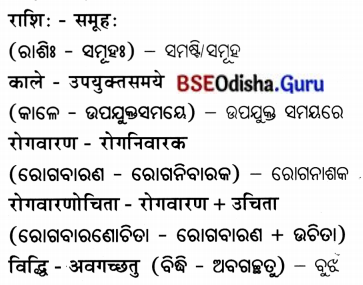
अतिरिक्त प्रश्नोत्तरम्
(ଅତିରିକ୍ତ ପ୍ରଶ୍ନୋତ୍ତରମ୍)
१. मातृभाषया अर्थं प्रकाशयत।
(क) काननम्
उत्तर :
ବଣ
(ख) राशि:
उत्तर :
ସମଷ୍ଟି
(ग) भव
उत्तर :
ହୁଅ
(घ) रक्ष
उत्तर :
ରକ୍ଷାକର

(ङ) काले
उत्तर :
ଉପଯୁକ୍ତ ସମୟରେ
२. उत्तर चयनं कुरूत।
(क) रक्ष रक्ष
(a) मातरम्
(b) भ्रातरम्
(c) काननम्
(d) मानवम्
उत्तर :
(c) କାନନମ୍
(ख) काले ……………. कारकम्।
(a) जल
(b) वृष्टि
(c) मेघ
(d) शीत
उत्तर :
(b) ବୃଷ୍ଟି
(ग) किंहि जीवनम् ?
(a) वृक्ष:
(b) वायु:
(c) यानं
(d) काननं
उत्तर :
(d) କାନନଂ
(घ) काननस्य नाशनं कस्य विधिनाशनम् ?
(a) स्वस्य
(b) तस्य
(c) यस्य
(d) मानवस्य
उत्तर :
(a) ସସ୍ୟ

(ङ) …………….. वर्धने निरतः सत्यरक्षणे।
(a) मृगस्य
(b) वृक्षस्य
(c) काननस्य
(d) जनस्य
उत्तर :
(c) କାନନସ୍ଯ
सर्वं नयामि विद्यालयम्
पुत्री – अम्ब ! न यामि विद्यालयम् ।
ପୁତ୍ରୀ – ଅମ୍ବ ! ନ ଯାମି ବିଦ୍ୟାଳୟମ୍ ।
अम्ब : न यामि विद्यालयम् ।
ଅମ୍ବ ! ନ ଯାମି ବିଦ୍ୟାଳୟମ୍ ।
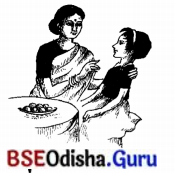
माता – किं प्रवृत्तं वद वत्से !
ମାତା – କିଂ ପ୍ରବୃତ୍ତ ବଦ ବତ୍ସ !
येनैवं त्वं नोत्सहसे ।
ଯେନୈବଂ ତଂ ନୋତ୍ସହସେ ।
पुत्री – चिनु-मिनु-पिनु-प्रमिला ।
ପୁତ୍ରୀ – ଚିନୁ-ମିନୁ-ପିନୁ-ପ୍ରମିଳା ।
सुरेश – गौरीश – गोपाल:
ସୁରେଶ-ଗୌରୀଶ-ଗୋପାନଃ
न केडपि मामभिभाषन्ते
ନ କେଽପି ମାମଭିଭାଷନ୍ତେ
न मया साकं मोदन्ते ।
ନ ମୟା ସାକଂ ମୋଦନ୍ତେ ।
जननी – अहो धृष्टता ईदृशी
ଜନନୀ – ଅହୋ ଧୃଷ୍ଟତା ଈଦୃଶୀ
बालानां किं भो : जल्पसि ?
ବାଳାନାଂ କିଂ ଭୋ ଜସି ?
अधुना यामि विद्यालयम्
ଅଧୁନା ଯାମି ବିଦ୍ୟାଳୟମ୍
वदामि सर्वम् आचार्यम् ।।
ବଦାମି ସର୍ବମ୍ ଆଚାର୍ଯ୍ୟମ୍ ।।
पुत्री – न तथा करोतु मे जननि !
ପୁତ୍ରୀ – ନ ତଥା କରୋତୁ ମ ଜନନି

नितरां कुप्यन्ति मित्राणि ।
ନିତରାଂ କୁପ୍ୟନ୍ତ ମିତ୍ରାଣି ।
जननी – अधुना किं वा करवाणि ?
ଜନନୀ– ଅଧୁନା କିଂ ବା କରବାଣି ?
ददाति किं ते मधुराणि ?
ଦଦାତି କିଂ ତେ ମଧୁରାଣି ?
पुत्री – अहो चतुरा मे जननी
ପୁତ୍ରୀ – ଅହୋ ଚତୁରା ମ ଜନନୀ
इटिति मदाशयग्राहिणी
ଝଟିତି ମଦାଶୟଗ୍ରାହିଣୀ
प्रेषय सर्वाणि मधुराणि
ପ୍ରେଷୟ ସର୍ବାଣି ମଧୁରାଣି
तोषय मम मित्राणि ।
ତୋଷୟ ମମ ମିତ୍ରାଣି ।
अधुना गच्छामि विद्यालयम्
ଅଧୁନା ଗଚ୍ଛାମି ବିଦ୍ୟାଳୟମ୍
देहि मधुरं सातिशयम्
ଦେହି ମଧୁରଂ ସାତିଶୟମ୍
अम्ब ! नयामि विद्यालयम्
ଅନ୍ତଃ ନୟାମି ବିଦ୍ୟାଳୟମ୍
सर्वं नयामि विद्यालयम् ।।
ସର୍ବଂ ନୟାମି ବିଦ୍ୟାଳୟମ୍ ।।
सन्धिविच्छद: (ସନ୍ଧିବିଚ୍ଛେଦଃ ) :
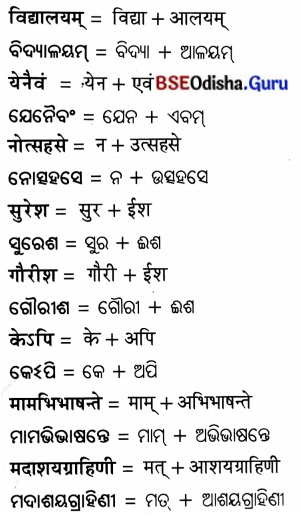
शब्दार्थ (ଶବ୍ଦାର୍ଥ) :
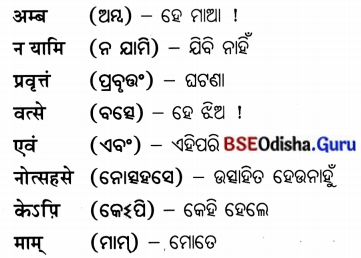
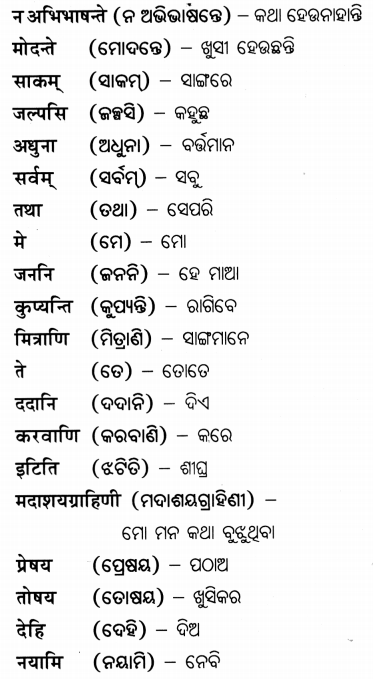
अतिरिक्त प्रश्नोत्तरम्
(ଅତିରିକ୍ତ ପ୍ରଶ୍ନୋତ୍ତରମ୍)
१. मातृभाषया अर्थं प्रकाशयत।
(क) अम्ब
उत्तर : ହେ ମାଆ !
(ख) साकम्
उत्तर : ସାଙ୍ଗରେ
(ग) देहि
उत्तर : ଦିଅ

(घ) तथा
उत्तर : ସେପରି
(ङ) कुप्यन्ति
उत्तर : ରାଗିଛନ୍ତି
२. उत्तर चयनं कुरूत।
(क) अम्ब ! न यामि विद्यालयम् इति का वदति ?
(a) पुत्री
(b) पुत्र:
(c) लता
(d) गीता
उत्तर :
(a) ପୁତ୍ରୀ
(ख) न मया सांकं …………..
(a) खेलन्ति
(b) वदन्ति
(c) मोदन्ते
(d) हसन्ति
उत्तर :
(c) ମୋଦନ୍ତେ
(ग) …………… यामि विद्यालयम्।
(a) अधुना
(b) तदा
(c) सर्वदा
(d) अद्य
उत्तर :
(a) ଅଧୁନା
(घ) अहो चतुरा मे……………
(a) मित्रम्
(b)आचार्य:
(c) पिता
(d) जननी
उत्तर :
(d) ଜନନୀ
(ङ) …………… मम मित्राणि।
(a) प्रेषय
(b) भक्षय
(c) तोषय
(d) मार्जय
उत्तर :
(c) ତୋଷୟ
उपदेशः (ଉପଦେଶଃ) ଉପଦେଶ
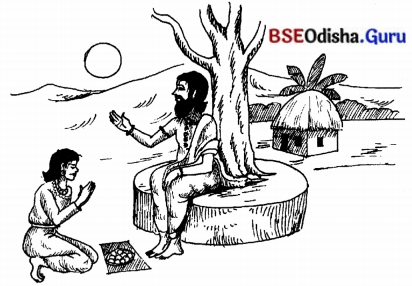
प्रत्युषकाले उच्तिष्ठतु
ପ୍ରତ୍ୟୁଷକାଳେ ଉତ୍ତିଷ୍ଠତୁ
स्वकीयं कर्म विदधातु
ସ୍ଵକୀୟଂ କର୍ମ ବିଦଧାତୁ
अल्पामाहारं स्वीकरोतु
ଅଳ୍ପାମାହାରଂ ସ୍ଵୀକରୋତୁ
गृहपठनम् आचरतु ।।
ଗୃହପଠନମ୍ ଆଚରତୁ ।

पौष्टिकं भोजनं खादतु
ପୌଷ୍ଟିକଂ ଭୋଜନଂ ଖାଦତୁ
विशुद्धं पानीयं पिबतु ।
ବିଶୁଦ୍ଧ ପାନୀ ପିବତୁ
हितोपदेशं पालयतु
ହିତୋପଦେଶଂ ପାଳୟତୁ
परोपकारं साधयतु ।।
ପରୋପକାରଂ ସାଧୟତୁ ।।
विद्यामन्दिरम् आगच्छतु
ବିଦ୍ୟାମନ୍ଦିରମ୍ ଆଗଚ୍ଛତୁ
तत्र नियमान् पालयतु ।
ତତ୍ର ନିୟମାନ୍ ପାଳଋତୁ ।
शृणोतु पठतु लिखतु
ଶୃଣୋତୁ ପଠତୁ ଲିଖନ୍ତୁ
क्रीडतु सत्यं कथयतु ।।
କ୍ରୀଡ଼ତୁ ସତ୍ୟ କଥୟତୁ ।।
आलस्यभावं वर्जयतु
ଆଳସ୍ୟଭାବଂ ବର୍ଜୟତୁ
मातापितरौ तोषयतु
ମାତାପିତରୌ ତୋଷୟତୁ
देशसेवकान् पूजयतु
ଦେଶସେବକାନ୍ ପୂଜୟତୁ
समाजे आदरमाप्नोतु ।।
ସମାଜେ ଆଦରମାପ୍ଳୁତୁ ।।
देशगौरवं बोधयतु
ଦେଶଗୌରବଂ ବୋଧୟତୁ
अनुजान् नित्यं मोदयतु
ଅନୁଜାନ୍ ନିତ୍ୟ ମୋଦୟତୁ
गुरुजनान् सम्मानयतु
ଗୁରୁଜନାନ୍ ସମ୍ମାନୟତୁ
विश्वबन्धुत्वं स्थापयतु ।।
ବିଶ୍ୱବନ୍ଧୁତ୍ୱ ସ୍ଥାପୟତୁ ।।
कठिनशब्दा: (କଠିନଶବ୍ଦା) :
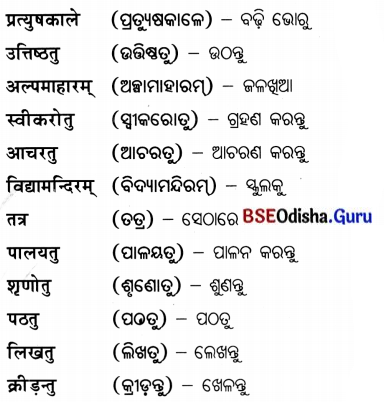
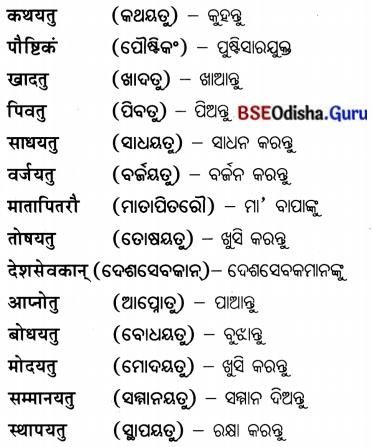
अतिरिक्त प्रश्नोत्तरम्
(ଅତିରିକ୍ତ ପ୍ରଶ୍ନୋତ୍ତରମ୍)
१. मातृभाषया अर्थं प्रकाशयत।
(क) पालयतु
उत्तर :
ପାଳନ କର
(ख) नियमान्
उत्तर :
ନିୟମଗୁଡ଼ିକୁ
(ग) बोधयतु
उत्तर :
ବୁଝାଅ

(घ) स्वकीयं
उत्तर :
ନିଜର
(ङ) कथयतु
उत्तर :
କୁହନ୍ତୁ
२. उत्तर चयनं कुरूत।
(क) किंस्वीकरोतु ?
(a) धनं
(b)अल्पमाहारं
(c) जनं
(d) फलं
उत्तर :
(b) ଅଳ୍ପମାହାରଂ
(ख) समाजे किम् आप्नोतु ?
(a) आदरम्
(b) सम्मानम्
(c) विद्याम्
(d) धनम्
उत्तर :
(a) ଆଦରମ୍
(ग) तत्र कान् पालयतु ?
(a) सर्वान्
(b) जनान्
(c) नियमान्
(d) कर्माण्
उत्तर :
(c) ନିୟମାନ୍
(घ) किं बोधयतु ?
(a) मानं
(b) पाठं
(c) ज्ञानं
(d) देशगौरवं
उत्तर :
(d) ଦେଶଗୌରବଂ
(ङ) कौ तोषयतु ?
(a) मातपितरौ
(b) गुरुजनौ
(c) देवौ
(d) पितरौ
उत्तर :
(a) ମାତାପିତରେ
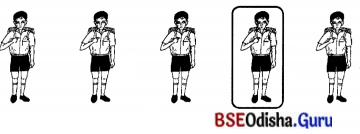
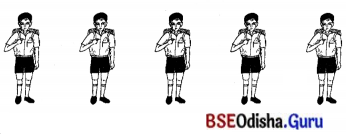


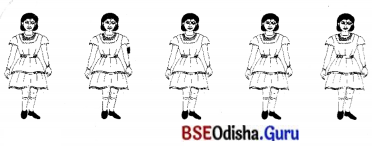
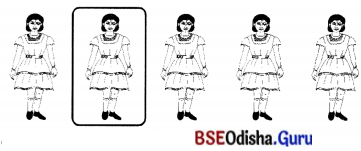
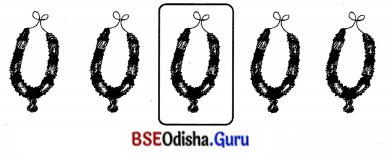
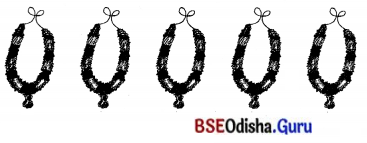
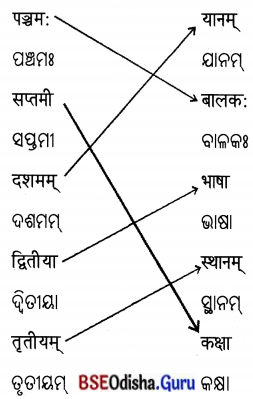
![]()
![]()
![]()
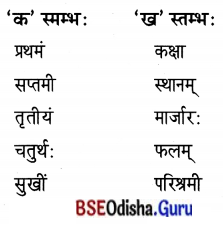
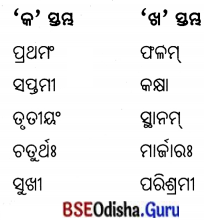
![]()
![]()
![]()
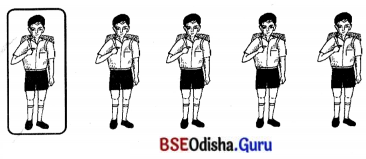
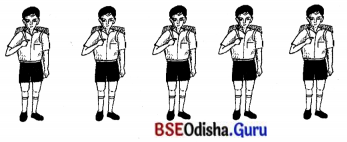
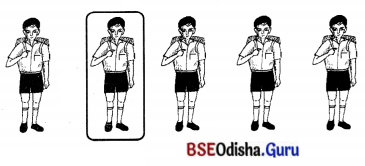
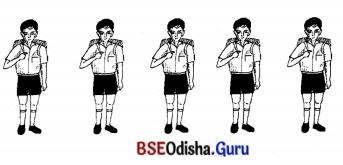
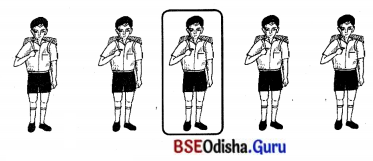
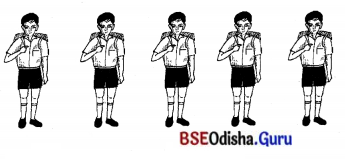
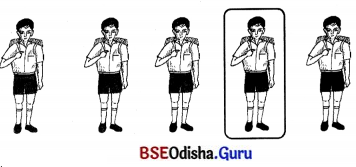
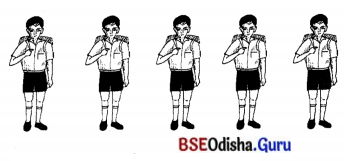
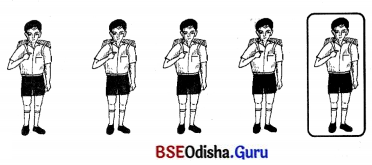
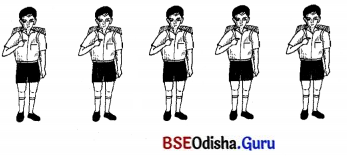
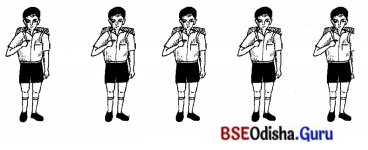
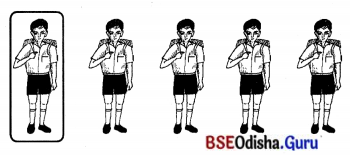
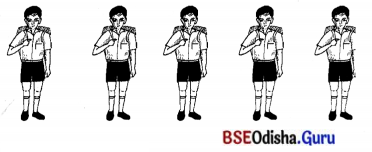
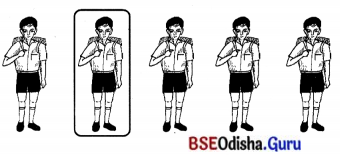
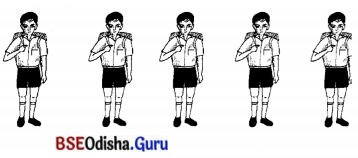
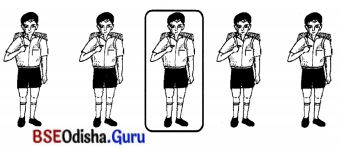
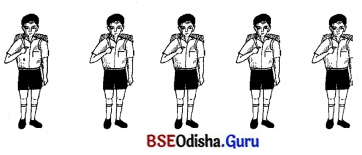
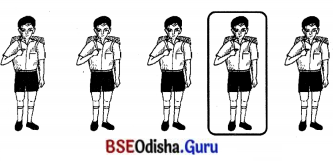
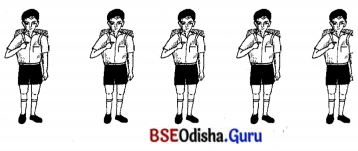
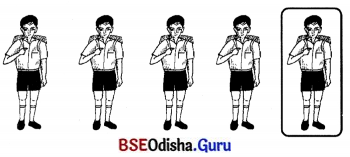
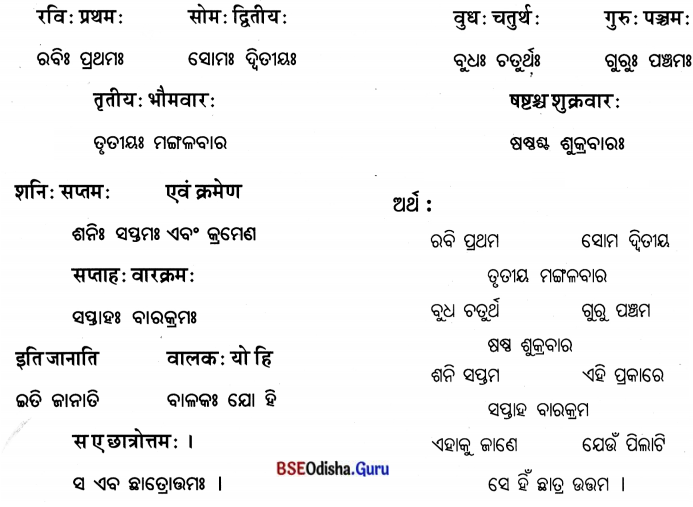
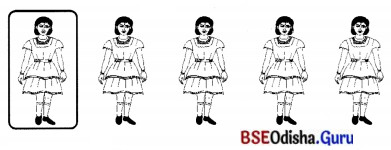
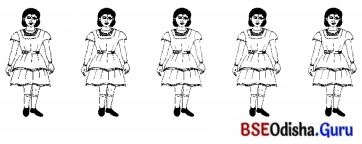
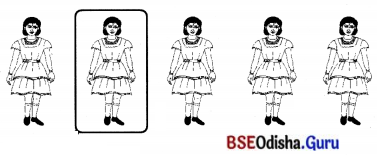
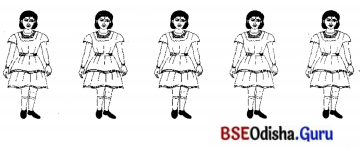
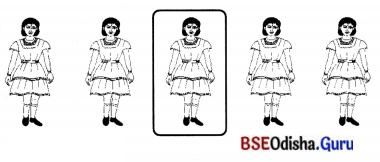
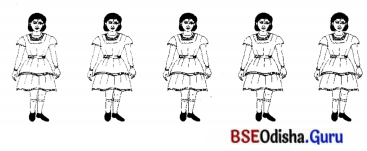
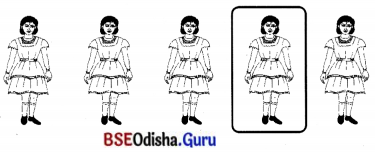
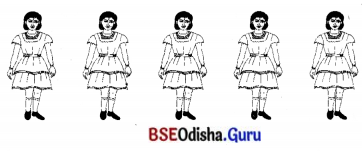
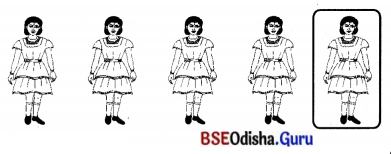
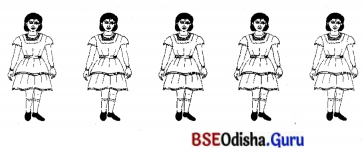
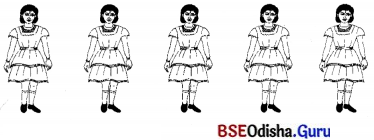
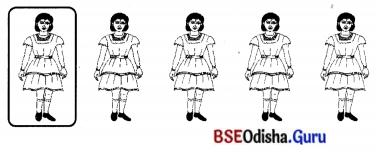
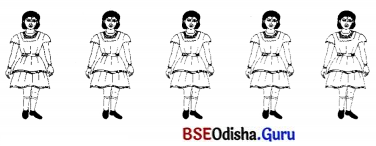
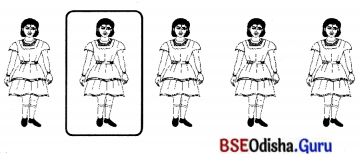
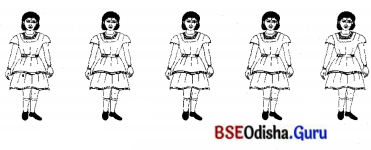
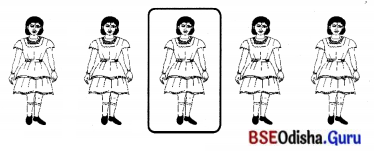
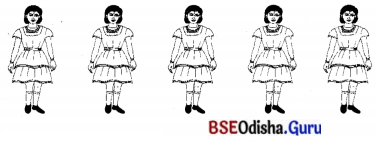
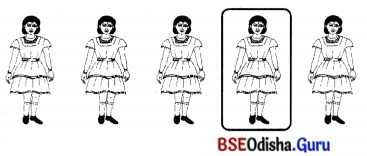
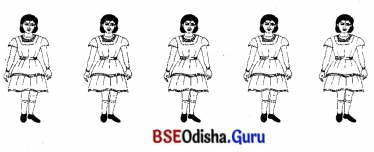
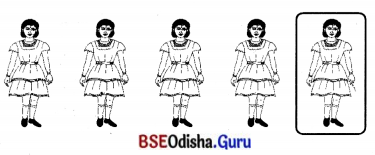

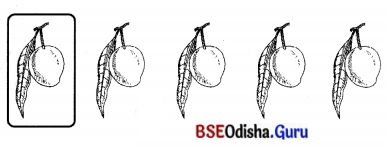
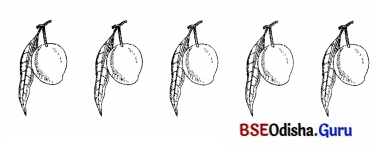
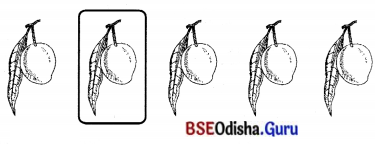
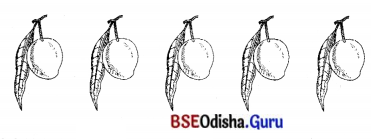
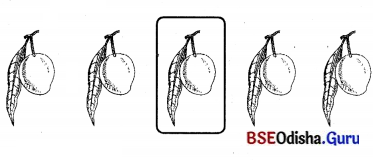
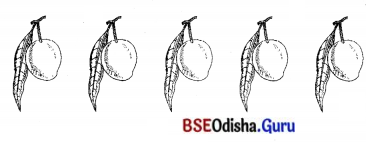
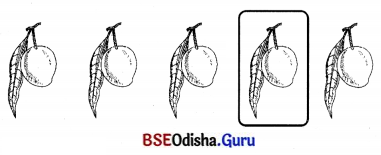
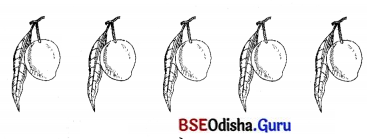
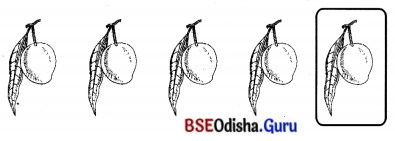
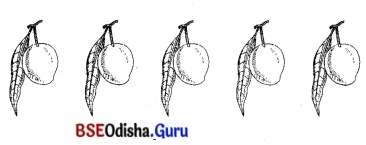
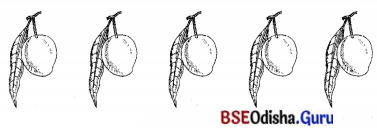
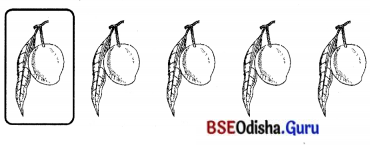
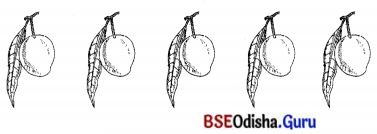
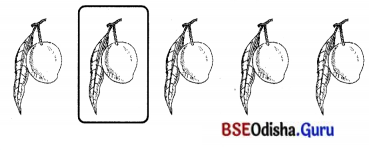
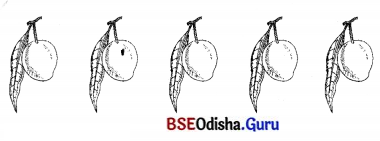
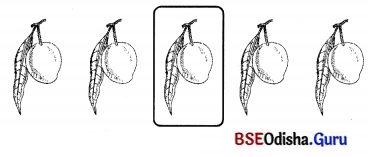
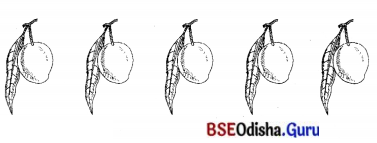
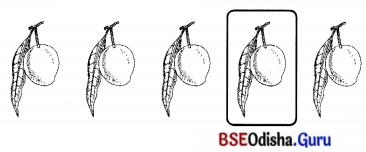
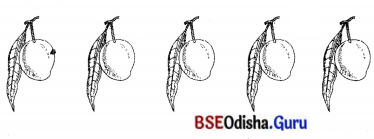
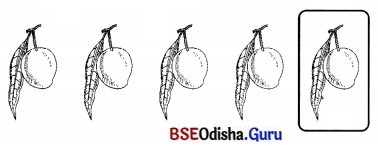
![]()

